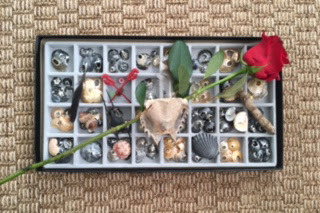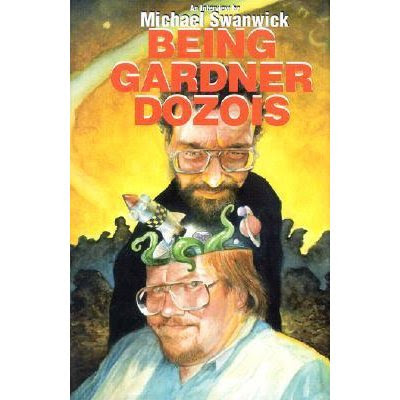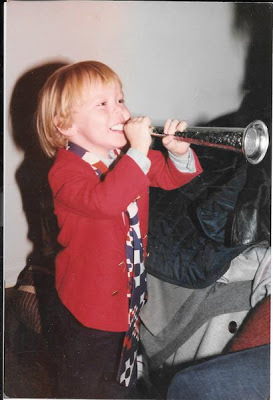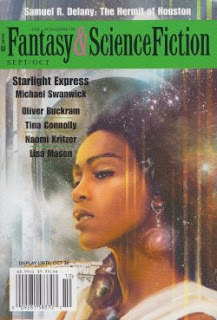Michael Swanwick's Blog, page 95
October 25, 2017
Why Your FIrst Novel EVEN MORE Shouldn't Be Volume One of a Tilogy
.

It needs to be said regularly: Don't start your career with a trilogy. I first published the essay below in 2010, but everything in it still applies.
Plus, I've added three more reasons why this is such a bad idea. Simply because over the years, people who made this mistake shared yet more regrets with me.
Read, learn, and send the link for this to friends who are gonnabe writers. The poverty and grief this prevents could be your own.
Why Your First Novel Shouldn't Be Volume One of a Trilogy
Three reasons, basically. One is artistic, the second psychological, and the third pragmatic.
The artistic reason is that at the beginning of your career, you're learning faster and improving more swiftly than you ever will again. That, and the fact that the mere act of publishing a book makes you a better writer, means that the prose styles of your first and second volumes will probably be considerably different. Most readers won't pick up on this. But the best ones will. And your very best reader is yourself. It's going to bug you to your dying day.
The psychological reason is that nine chances out of ten, no matter how much you love your first novel when it's fresh out of the oven, several years down the line you're going to end up disliking it. It may not deserve your dislike. But this is an observable phenomenon. Writers wind up being embarrassed by their first. And if your first is volume one of a trilogy, that's three books you're going to end up unhappy about.
The first two reasons are trivial, really. But the pragmatic one is desperately important. Here it is:
The timing of publishing is such that the "numbers" for your first book -- the sales figures, basically, the book's profitability -- won't be available by the time you turn in the second volume. Since your editor liked the first book, the second one is a pretty sure sale. But by the time you've finished writing the third volume, however, your publishing house will know the numbers. And if the numbers aren't good, the book will not be bought.
Which means that book will not be sellable. No other publisher will want to buy volume three of a trilogy whose first two volumes are owned by another house. You'll have to wait until your first two books are out of print, revert the rights, and try to sell the trilogy anew. But that will take years, and your dream-child will at that point be damaged goods. Unless you've subsequently become extremely popular, it will probably still be unsellable.
Imagine how it must feel to have two published novels under your belt and then find you can't sell your third. It must feel exactly like being fired for incompetence. It is going to discourage the hell out of you.
But wait! There's more!
Let's imagine that your first two books luck out and your editor wants the third. That means you're stuck with that editor. If you like the editor, that's good news. But if you and your editor can't agree on what your books should be... If you fight like cats and dogs... If you think he or she is crazy or vindictive or just doesn't know the job... Then you've got years of misery in front of you.
Nor does it end there. Let's imagine that you signed a three-volume contract on the strength of your first book. It makes perfect sense for the editor to do that. It locks you in at as low an advance as you're ever likely to get in your career for books Two and Three. If the first two don't sell, the editor can cut losses, fork over the advance, and wash his or her hands of you. Plus, if your agent wasn't paying attention, the contracts will have a "basket accounting" clause.
What, you ask, is this? It's a very simple way of not paying royalties for as long as possible. Let's say you get an advance of seven thousand dollars per book, half payable upon delivery of the book and half upon publication (a publishing term meaning anywhere between six to eighteen months after publication). And let's say your book earns out (sells enough copies to pay for your advance). In fact, it earns ten thousand dollars. That means they owe you three grand, right?
Not with basket accounting. With this clause, you don't get a penny in royalties until all three books have earned out. So your second book brings in another ten thousand? That's six thousand dollars they don't have to fork over until well after your third book is published.
By which time, you're likely to be feeling a little annoyed at your agent for letting you sign the contract in the first place. Which is the sixth reason why starting your career with a trilogy is a bad idea.
A writer's relationship with his or her agent is extremely important. Much the same as I was lucky in love, I was lucky in agents. But I've known many people who couldn't get along with their agents at all. Maybe they wanted to write Regency romances and the agent wanted them to writer SF thrillers. Maybe the agent had no interest in the sort of thing they wrote and went about selling it with all the enthusiasm of a vegan peddling calf's liver. The reason doesn't matter. Because, just as you're stuck with your editor, you're stuck with your agent. A new agent isn't going to want to pick you up mid-trilogy. Your current agent isn't going to let go control of a book they went through a lot of trouble to sell. So there you are.
Fighting with your editor, bickering with your agent, and watching your books rack up royalties that you won't get to touch for years.
And remember. . .
If you simply must write a trilogy, then go on ahead with a clean conscience. All the best books are books that the the author had no choice but to write. And all writing advice is like pantyhose -- anybody who tells you that "one size fits all" is lying.
But if any or all of the evils detailed above happen to your career, don't say that nobody warned you.
Above: A bottle of wine from Some Young Punks Winery. Just to cut the mood of doom and gloom.
*

It needs to be said regularly: Don't start your career with a trilogy. I first published the essay below in 2010, but everything in it still applies.
Plus, I've added three more reasons why this is such a bad idea. Simply because over the years, people who made this mistake shared yet more regrets with me.
Read, learn, and send the link for this to friends who are gonnabe writers. The poverty and grief this prevents could be your own.
Why Your First Novel Shouldn't Be Volume One of a Trilogy
Three reasons, basically. One is artistic, the second psychological, and the third pragmatic.
The artistic reason is that at the beginning of your career, you're learning faster and improving more swiftly than you ever will again. That, and the fact that the mere act of publishing a book makes you a better writer, means that the prose styles of your first and second volumes will probably be considerably different. Most readers won't pick up on this. But the best ones will. And your very best reader is yourself. It's going to bug you to your dying day.
The psychological reason is that nine chances out of ten, no matter how much you love your first novel when it's fresh out of the oven, several years down the line you're going to end up disliking it. It may not deserve your dislike. But this is an observable phenomenon. Writers wind up being embarrassed by their first. And if your first is volume one of a trilogy, that's three books you're going to end up unhappy about.
The first two reasons are trivial, really. But the pragmatic one is desperately important. Here it is:
The timing of publishing is such that the "numbers" for your first book -- the sales figures, basically, the book's profitability -- won't be available by the time you turn in the second volume. Since your editor liked the first book, the second one is a pretty sure sale. But by the time you've finished writing the third volume, however, your publishing house will know the numbers. And if the numbers aren't good, the book will not be bought.
Which means that book will not be sellable. No other publisher will want to buy volume three of a trilogy whose first two volumes are owned by another house. You'll have to wait until your first two books are out of print, revert the rights, and try to sell the trilogy anew. But that will take years, and your dream-child will at that point be damaged goods. Unless you've subsequently become extremely popular, it will probably still be unsellable.
Imagine how it must feel to have two published novels under your belt and then find you can't sell your third. It must feel exactly like being fired for incompetence. It is going to discourage the hell out of you.
But wait! There's more!
Let's imagine that your first two books luck out and your editor wants the third. That means you're stuck with that editor. If you like the editor, that's good news. But if you and your editor can't agree on what your books should be... If you fight like cats and dogs... If you think he or she is crazy or vindictive or just doesn't know the job... Then you've got years of misery in front of you.
Nor does it end there. Let's imagine that you signed a three-volume contract on the strength of your first book. It makes perfect sense for the editor to do that. It locks you in at as low an advance as you're ever likely to get in your career for books Two and Three. If the first two don't sell, the editor can cut losses, fork over the advance, and wash his or her hands of you. Plus, if your agent wasn't paying attention, the contracts will have a "basket accounting" clause.
What, you ask, is this? It's a very simple way of not paying royalties for as long as possible. Let's say you get an advance of seven thousand dollars per book, half payable upon delivery of the book and half upon publication (a publishing term meaning anywhere between six to eighteen months after publication). And let's say your book earns out (sells enough copies to pay for your advance). In fact, it earns ten thousand dollars. That means they owe you three grand, right?
Not with basket accounting. With this clause, you don't get a penny in royalties until all three books have earned out. So your second book brings in another ten thousand? That's six thousand dollars they don't have to fork over until well after your third book is published.
By which time, you're likely to be feeling a little annoyed at your agent for letting you sign the contract in the first place. Which is the sixth reason why starting your career with a trilogy is a bad idea.
A writer's relationship with his or her agent is extremely important. Much the same as I was lucky in love, I was lucky in agents. But I've known many people who couldn't get along with their agents at all. Maybe they wanted to write Regency romances and the agent wanted them to writer SF thrillers. Maybe the agent had no interest in the sort of thing they wrote and went about selling it with all the enthusiasm of a vegan peddling calf's liver. The reason doesn't matter. Because, just as you're stuck with your editor, you're stuck with your agent. A new agent isn't going to want to pick you up mid-trilogy. Your current agent isn't going to let go control of a book they went through a lot of trouble to sell. So there you are.
Fighting with your editor, bickering with your agent, and watching your books rack up royalties that you won't get to touch for years.
And remember. . .
If you simply must write a trilogy, then go on ahead with a clean conscience. All the best books are books that the the author had no choice but to write. And all writing advice is like pantyhose -- anybody who tells you that "one size fits all" is lying.
But if any or all of the evils detailed above happen to your career, don't say that nobody warned you.
Above: A bottle of wine from Some Young Punks Winery. Just to cut the mood of doom and gloom.
*
Published on October 25, 2017 00:30
October 24, 2017
Winooski, My Town
.
I was doing some preliminary research on a novel I might (or might not) write three or four books from now when I ran across Winooski, My Town , a paean to Winooski, Vermont, by A2VT That's where I grew up. It amazes me how many of the shots bring back memories.
Also, these guys are really good, aren't they?
And while we're on the subject...
Did you know that Winooski was once the front-runner to become the world's first domed city? You can read the entire remarkable story here.
*
I was doing some preliminary research on a novel I might (or might not) write three or four books from now when I ran across Winooski, My Town , a paean to Winooski, Vermont, by A2VT That's where I grew up. It amazes me how many of the shots bring back memories.
Also, these guys are really good, aren't they?
And while we're on the subject...
Did you know that Winooski was once the front-runner to become the world's first domed city? You can read the entire remarkable story here.
*
Published on October 24, 2017 08:15
October 20, 2017
My Vacation Diary
.

Marianne and I do a lot of traveling and we travel actively. We travel to discover, to learn, to stand frozen with awe. We wander down dirt roads just to see where they lead to. But once a year we rent a beach house, down the Shore and do nothing at all.
Except for a Halloween story and half a dozen stories openings composed in the half-state between sleeping and waking, which I jotted down because it would be waste not to, and notes for a speech I have to make, I didn't even write.
Which doesn't mean we were completely sedentary. We walked along the beach, looking for mermaid's toenails. We strolled through nature preserves. We went to a bar on a schooner docked at the Lobster House and drank martinis.We assembled a jigsaw puzzle. We bought flowers to brighten up the rental.
I did keep a diary, though. That's it up above.
And don't forget...
Tje Orionids are tonight. Always worth seeing.
*

Marianne and I do a lot of traveling and we travel actively. We travel to discover, to learn, to stand frozen with awe. We wander down dirt roads just to see where they lead to. But once a year we rent a beach house, down the Shore and do nothing at all.
Except for a Halloween story and half a dozen stories openings composed in the half-state between sleeping and waking, which I jotted down because it would be waste not to, and notes for a speech I have to make, I didn't even write.
Which doesn't mean we were completely sedentary. We walked along the beach, looking for mermaid's toenails. We strolled through nature preserves. We went to a bar on a schooner docked at the Lobster House and drank martinis.We assembled a jigsaw puzzle. We bought flowers to brighten up the rental.
I did keep a diary, though. That's it up above.
And don't forget...
Tje Orionids are tonight. Always worth seeing.
*
Published on October 20, 2017 09:32
October 18, 2017
Outposts!
.

They're hard to spot, difficult to find. But if you're patient and tenacious -- and if you're looking in the right place -- they're there to be found.
Up above: Amid the litter of the forest floor, there's a pebble topped by an acorn cap. Coincidence, you say? What's that pebble doing atop the leaves? Harrumph. Had it just been thrown there by an energetic foot on a nearby gravel path (but there was no gravel path nearby), what were the odds of an acorn cap, separated from its nut by the force of its fall, landing exactly there? Is that reasonable to expect?
No.
What you see is a boundary marker set out by the Very Wee Folk at the edge of their territory.
Should you chance upon one, your impulse will surely be to shake off the cap and toss the bit of gravel far. Or maybe you'll kick them both as far as ever you can.
Bad mistake.
The Very Wee Folk are extremely territorial. Feuds have begun over a matter of an inch. Wars have been fought over patches of ground you could stride over in a minute. Generations have bled and died for this stretch of land beneath your notice.
So when you kick over their boundary marker, you're setting the Very wee Folk up to die in great number.
But they're not going to play your sick little game. Kick the thing over and come morning, you're going to be hearing from their lawyer.
And am I, you ask, still on vacation...?
If I weren't on vacation, I'd answer that question.
Above: For some reason, I was feeling whimsical.
*

They're hard to spot, difficult to find. But if you're patient and tenacious -- and if you're looking in the right place -- they're there to be found.
Up above: Amid the litter of the forest floor, there's a pebble topped by an acorn cap. Coincidence, you say? What's that pebble doing atop the leaves? Harrumph. Had it just been thrown there by an energetic foot on a nearby gravel path (but there was no gravel path nearby), what were the odds of an acorn cap, separated from its nut by the force of its fall, landing exactly there? Is that reasonable to expect?
No.
What you see is a boundary marker set out by the Very Wee Folk at the edge of their territory.
Should you chance upon one, your impulse will surely be to shake off the cap and toss the bit of gravel far. Or maybe you'll kick them both as far as ever you can.
Bad mistake.
The Very Wee Folk are extremely territorial. Feuds have begun over a matter of an inch. Wars have been fought over patches of ground you could stride over in a minute. Generations have bled and died for this stretch of land beneath your notice.
So when you kick over their boundary marker, you're setting the Very wee Folk up to die in great number.
But they're not going to play your sick little game. Kick the thing over and come morning, you're going to be hearing from their lawyer.
And am I, you ask, still on vacation...?
If I weren't on vacation, I'd answer that question.
Above: For some reason, I was feeling whimsical.
*
Published on October 18, 2017 05:32
October 16, 2017
Summer and Sex in Seventies Philadelphia
.

When I first came to Philly in the early Seventies, the city shut down in summer. Air conditioning was rare. You'd go to a movie theater and watch a bad movie just for the temporary respite. Almost all the restaurants closed. During the dog days of August, you'd lie naked on top of the sweaty sheets of your bed, panting like a dog.
Not in a sexy way.
I remember, one Sunday morning in August, walking up the dotted line in the center of Chestnut Street, arms out as if it were a tightrope. There wasn't a car to be seen, from river to river.
All big cities have sexual accommodations peculiar to them. In Philadelphia, the custom was for affluent businessmen to rent a summer house "down the Shore," for the family. The wife and kids would stay there all summer. The businessman would spend weekends with them and during the week have an affair with his secretary.
When I first came to Philly, it was the custom for wealthy families on the East Coast to park their gay scions here, where their activities wouldn't cause scandal in their social circles. So there was a large and vibrant community of young men sowing their wild oats before being called back, when older and more discreet, to take up the reins of their family businesses. When I was out, late at night, I always walked home on Spruce Street, which was the spine of what later became known as the Gayborhood, because it was always filled with respectable young men who'd have come to my aid if somebody tried to mug me.
There was also an arrangement, the name for which I've forgotten, wherein wealthy older men sponsored respectable-and-presentable young women. "Mistress" overstates the emotional component of the relationship and "escort" goes too far in the other direction. Let's say "companion." Sex was involved, but the main purpose was for the man to have a young and presentable companion on social occasions. I had a friend who companioned herself through art school. She had a regular salary and was allowed to have a boyfriend (in my friend's case, many boyfriends, none of them commercial arrangements), but when her sponsor called, she had to drop everything, glam up, and hurry to his side. The rich have similar arrangements elsewhere, but I've never lived anywhere where it was openly expressed as here.
So that's my city back then. What sexual arrangements are peculiar to your city right now?
And speaking of summer...
I spent the summer working hard on The Iron Dragon's Mother. So I'm only now spending my summer vacation in a beach house down the Shore.
Secretaries most explicitly not involved.
Above: There's another thing that's changed. Back then, people joked about how bad weather prediction was. "They predicted no rain, so you'd better bring an umbrella. Har har har." But now, with weather satellites, radar, and the like, AccuWeather delivers predictions that are, well... accurate.
*

When I first came to Philly in the early Seventies, the city shut down in summer. Air conditioning was rare. You'd go to a movie theater and watch a bad movie just for the temporary respite. Almost all the restaurants closed. During the dog days of August, you'd lie naked on top of the sweaty sheets of your bed, panting like a dog.
Not in a sexy way.
I remember, one Sunday morning in August, walking up the dotted line in the center of Chestnut Street, arms out as if it were a tightrope. There wasn't a car to be seen, from river to river.
All big cities have sexual accommodations peculiar to them. In Philadelphia, the custom was for affluent businessmen to rent a summer house "down the Shore," for the family. The wife and kids would stay there all summer. The businessman would spend weekends with them and during the week have an affair with his secretary.
When I first came to Philly, it was the custom for wealthy families on the East Coast to park their gay scions here, where their activities wouldn't cause scandal in their social circles. So there was a large and vibrant community of young men sowing their wild oats before being called back, when older and more discreet, to take up the reins of their family businesses. When I was out, late at night, I always walked home on Spruce Street, which was the spine of what later became known as the Gayborhood, because it was always filled with respectable young men who'd have come to my aid if somebody tried to mug me.
There was also an arrangement, the name for which I've forgotten, wherein wealthy older men sponsored respectable-and-presentable young women. "Mistress" overstates the emotional component of the relationship and "escort" goes too far in the other direction. Let's say "companion." Sex was involved, but the main purpose was for the man to have a young and presentable companion on social occasions. I had a friend who companioned herself through art school. She had a regular salary and was allowed to have a boyfriend (in my friend's case, many boyfriends, none of them commercial arrangements), but when her sponsor called, she had to drop everything, glam up, and hurry to his side. The rich have similar arrangements elsewhere, but I've never lived anywhere where it was openly expressed as here.
So that's my city back then. What sexual arrangements are peculiar to your city right now?
And speaking of summer...
I spent the summer working hard on The Iron Dragon's Mother. So I'm only now spending my summer vacation in a beach house down the Shore.
Secretaries most explicitly not involved.
Above: There's another thing that's changed. Back then, people joked about how bad weather prediction was. "They predicted no rain, so you'd better bring an umbrella. Har har har." But now, with weather satellites, radar, and the like, AccuWeather delivers predictions that are, well... accurate.
*
Published on October 16, 2017 09:13
October 4, 2017
I've Been Humbled Bundled!
.

"I know what Humble Bundle is," my son said. "But I'm surprised you know."
Sean, it turns out, is a big Humble Bundle fan. He has, apparently, bought tons of ebooks from them. He never mentioned this fact to me, or even that he reads ebooks because, well, you know... Dads.
At any rate, yes. Vacuum Flowers, my big space novel, chock-full of ideas and near-naked people, is part of a Humble Bundle offer. And it's on the first tier, which means that you can get it and four other excellent books for only a dollar. If that's how little you want to spend.
Here's what it says on the press release:
So you get lots and lots of space adventure, contribute to a worthy cause, and get to name your own price. If that's not your cup of tea, you just don't like reading space adventure ebooks. De gustibus non est disputandum.
The offer, which starts today and ends on the 18th, can be found here.
And let me put in a plug for...
There are a lot of Big Names in this bundle. But let me suggest you put in enough money to get Starrigger by John DeChancie. The basic premise sounds almost comic... truck drivers to the stars! But he pulled it off. There's a lot of good old-fashioned science-fictional invention and adventure in this book. Here, from Wikipedia, is the basic premise:
And now you know if that's your sort of thing. Starrigger is the first volume of a trilogy. But if you're like me, you'll consider the fact that there are two more books good news. DeChancie is a fine writer and I'm sorry he's not better known.
*

"I know what Humble Bundle is," my son said. "But I'm surprised you know."
Sean, it turns out, is a big Humble Bundle fan. He has, apparently, bought tons of ebooks from them. He never mentioned this fact to me, or even that he reads ebooks because, well, you know... Dads.
At any rate, yes. Vacuum Flowers, my big space novel, chock-full of ideas and near-naked people, is part of a Humble Bundle offer. And it's on the first tier, which means that you can get it and four other excellent books for only a dollar. If that's how little you want to spend.
Here's what it says on the press release:
Humble Bundle and Open Road Media have teamed up to provide 20+ space adventure ebooks from award-winning authors. Choose what you want to pay, and you’ll also be supporting SFWA, which helps support and advocate for some of our favorite SciFi/Fantasy authors.
So you get lots and lots of space adventure, contribute to a worthy cause, and get to name your own price. If that's not your cup of tea, you just don't like reading space adventure ebooks. De gustibus non est disputandum.
The offer, which starts today and ends on the 18th, can be found here.
And let me put in a plug for...
There are a lot of Big Names in this bundle. But let me suggest you put in enough money to get Starrigger by John DeChancie. The basic premise sounds almost comic... truck drivers to the stars! But he pulled it off. There's a lot of good old-fashioned science-fictional invention and adventure in this book. Here, from Wikipedia, is the basic premise:
Jake McGraw drives a futuristic cargo truck on the Skyway. The Skyway itself is a mysterious road, built by an unknown race of aliens, which runs across various planets from one portal to another. Driving through a portal (a "tollbooth") instantaneously transports you onto a different planet, many light years away. Humans found the Skyway on Pluto and began expanding along it, encountering various alien races along the way. However no one has a map, or knows where the Skyway begins or ends, and because each portal is one-way, only explored sections with a known return path (discovered by trial and error) are considered safe to travel.
And now you know if that's your sort of thing. Starrigger is the first volume of a trilogy. But if you're like me, you'll consider the fact that there are two more books good news. DeChancie is a fine writer and I'm sorry he's not better known.
*
Published on October 04, 2017 11:05
October 3, 2017
Live! Tonight! Me! In Brooklyn!
.

Gardner Dozois and I will be reading tonight at the New York Review of Science Readings series in Brooklyn. This will be at The Brooklyn Commons Cafe at 388 Atlantic Avenue. The doors open at 6:30, the riotous fun begins a 7:00, and the suggested donation is $7. This means that if you're a genuinely impoverished bohemian, you can just slink in and nobody will think the less of you.
So why go? Chiefly, to hear Gardner. He's best known for his two decades as editor of Asimov's Science Fiction and his 34 years as editor of The Year's Best Science Fiction. But those who know him best know that he's an even better writer than he is an editor. He quit writing when he took the Asimov's gig, but in recent months he's returned to the profession -- so this is your chance to discover if he's still got the chops.
No pressure, Gardner.
I'll be there, too, reading from my forthcoming novel, The Iron Dragon's Mother. This book completes the trilogy I began a quarter-century ago. Find out if it was time well spent.
No pressure, Michael.
The NYRSF readings are always fun. There's always a crowd of friendly, intelligent people and they always seem to be enjoying themselves. So what the heck. Why not?
Above: Omar Rayyan made that wonderful image from pix he found on the Web. He'd never seen either Gardner or me in his life. I still marvel at that.
*

Gardner Dozois and I will be reading tonight at the New York Review of Science Readings series in Brooklyn. This will be at The Brooklyn Commons Cafe at 388 Atlantic Avenue. The doors open at 6:30, the riotous fun begins a 7:00, and the suggested donation is $7. This means that if you're a genuinely impoverished bohemian, you can just slink in and nobody will think the less of you.
So why go? Chiefly, to hear Gardner. He's best known for his two decades as editor of Asimov's Science Fiction and his 34 years as editor of The Year's Best Science Fiction. But those who know him best know that he's an even better writer than he is an editor. He quit writing when he took the Asimov's gig, but in recent months he's returned to the profession -- so this is your chance to discover if he's still got the chops.
No pressure, Gardner.
I'll be there, too, reading from my forthcoming novel, The Iron Dragon's Mother. This book completes the trilogy I began a quarter-century ago. Find out if it was time well spent.
No pressure, Michael.
The NYRSF readings are always fun. There's always a crowd of friendly, intelligent people and they always seem to be enjoying themselves. So what the heck. Why not?
Above: Omar Rayyan made that wonderful image from pix he found on the Web. He'd never seen either Gardner or me in his life. I still marvel at that.
*
Published on October 03, 2017 08:53
September 29, 2017
A Dream from My Son's Childhood
.

I was going through a mound of papers in my office, finding old magazines, half-written stories, maps of foreign cities and the like when I came across a sheet of paper typed out when my son Sean was only four years old.
Here's what it said:
"Trains"
It was bedtime and I was going to read Sean another chapter of Stuart Little. But we got sidetracked and he told me about his dream instead. He was hte engineer on a "strange train" and it went into Dinosaur Land. The dinosaurs were very fierce but there were walls to either side of the track. The dinosaurs couldn't get to him because he'd built gates. THe gates kept the dinosaurs out. He painted hte train in bright colors. It was very bright. It was pink mostly. Was there green? No. Yellow? Yes. Blue? No. He didn't want to paint the bathroom because it was wet. He met an Apatosaurus. What did it say? Apatosauruses can't talk. It wanted to get in. It wanted to know where the gates were, but Sean didn't tell. The train was a half-circle on the bottom and painted very bright inside, and a half circle on hte top. The people who gave him the parts to build the train wanted him to paint it very bright. What were the people who gave him the parts like? "They were Dotty and Louise and Alice and Grandmother and Grandfather."
7/87
That was over thirty years ago -- or, in Dad time, three or four months.
And the moral of this story is...
Tempus fugit. Parents should write down incidents like this while they can.
Above: Sean Swanwick. I think the photo was by Gardner Dozois or Susan Casper. It was taken during a New Year's Eve party in their then apartment in Society Hill.
*

I was going through a mound of papers in my office, finding old magazines, half-written stories, maps of foreign cities and the like when I came across a sheet of paper typed out when my son Sean was only four years old.
Here's what it said:
"Trains"
It was bedtime and I was going to read Sean another chapter of Stuart Little. But we got sidetracked and he told me about his dream instead. He was hte engineer on a "strange train" and it went into Dinosaur Land. The dinosaurs were very fierce but there were walls to either side of the track. The dinosaurs couldn't get to him because he'd built gates. THe gates kept the dinosaurs out. He painted hte train in bright colors. It was very bright. It was pink mostly. Was there green? No. Yellow? Yes. Blue? No. He didn't want to paint the bathroom because it was wet. He met an Apatosaurus. What did it say? Apatosauruses can't talk. It wanted to get in. It wanted to know where the gates were, but Sean didn't tell. The train was a half-circle on the bottom and painted very bright inside, and a half circle on hte top. The people who gave him the parts to build the train wanted him to paint it very bright. What were the people who gave him the parts like? "They were Dotty and Louise and Alice and Grandmother and Grandfather."
7/87
That was over thirty years ago -- or, in Dad time, three or four months.
And the moral of this story is...
Tempus fugit. Parents should write down incidents like this while they can.
Above: Sean Swanwick. I think the photo was by Gardner Dozois or Susan Casper. It was taken during a New Year's Eve party in their then apartment in Society Hill.
*
Published on September 29, 2017 08:52
September 27, 2017
A Few More Words of "Starlight"
.

The Magazine of Fantasy & Science Fiction has just posted a brief interview with me about my story "Starlight Express," which is in their current issue. The beautiful cover by Maurizio Manzieri summarizes the spirit of the story.
On those rare occasions when I teach, the students are always anxious to learn how to describe a character's appearance. Since I spent more time describing Flaminio (the protagonist) and Szett (the woman he meets under strange circumstances, I thought I'd share with you the entirety of those descriptions:
As I said, that's as much description as I ever give fictional characters -- because nothing more is needed. Create a convincing character and the reader will imagine an appropriate appearance for someone behaving in that manner. It's as simple as that.
You can read the interview here.
And the big news is...
There is a brand new story by Samuel R. Delany in the very same issue of F&SF. It's the first work of science fiction that he's written in decades, so "The Hermit of Houston" is a very big deal indeed. As could be expected, it's strange, challenging, and inventive. I like it enormously.
*

The Magazine of Fantasy & Science Fiction has just posted a brief interview with me about my story "Starlight Express," which is in their current issue. The beautiful cover by Maurizio Manzieri summarizes the spirit of the story.
On those rare occasions when I teach, the students are always anxious to learn how to describe a character's appearance. Since I spent more time describing Flaminio (the protagonist) and Szett (the woman he meets under strange circumstances, I thought I'd share with you the entirety of those descriptions:
Where Flaminio had the ruddy complexion and coarse face of one of Martian terraformer ancestry, the woman had aristocratic features, the brown eyes and high cheekbones and wide nose of antique African blood.
As I said, that's as much description as I ever give fictional characters -- because nothing more is needed. Create a convincing character and the reader will imagine an appropriate appearance for someone behaving in that manner. It's as simple as that.
You can read the interview here.
And the big news is...
There is a brand new story by Samuel R. Delany in the very same issue of F&SF. It's the first work of science fiction that he's written in decades, so "The Hermit of Houston" is a very big deal indeed. As could be expected, it's strange, challenging, and inventive. I like it enormously.
*
Published on September 27, 2017 10:48
September 22, 2017
Putting Your Best Foot Forward
.

Here's a story with the names rubbed off, lest I unintentionally give offense. Back in the Eighties, when I was what Gardner Dozois would persist in calling "a hot new writer," for a full decade, a small press published s series of small, cheap SF paperbacks, each containing half a dozen or so stories by a writer whom I considered one of the best of my generation. I eagerly bought them all... and was invariably disappointed. Because they'd all saved their best work for an eventual hardcover collection.
Years later, I was talking to Jim Turner, the extremely valuable editor of Arkham House and later Golden Gryphon Press about these collections, and he said, "There was no reason not to use their best. I wasn't in direct competition with those books."
I remembered this later, when Chris Logan Edwards suggested I put together a slim collection of stories for his Tigereyes Press. So I went through my uncollected works and chose the very best and because they all were written in recent years, they had an underlying unity that worked well. Chris created a beautiful book with a wonderful cover by artist Lee Moyer
A Geography of Unknown Lands placed on the ballot for the World Fantasy Award for best collection.
The moral here, I think, is obvious.
And the reason for the picture above is...
So off I went, out into the countryside, on what I would have called a "mental health day," back when I pulled down a salary.
The picture above is of a cormorant drying its wings in the sun. Cormorants work hard. Usually, I do tool. But not every day.
Above: Photograph by M. C. Porter. Marianne is a much better photographer than I'll ever be.
Published on September 22, 2017 00:30
Michael Swanwick's Blog
- Michael Swanwick's profile
- 546 followers
Michael Swanwick isn't a Goodreads Author
(yet),
but they
do have a blog,
so here are some recent posts imported from
their feed.



